Why Studying Abroad Beats Learning with AI
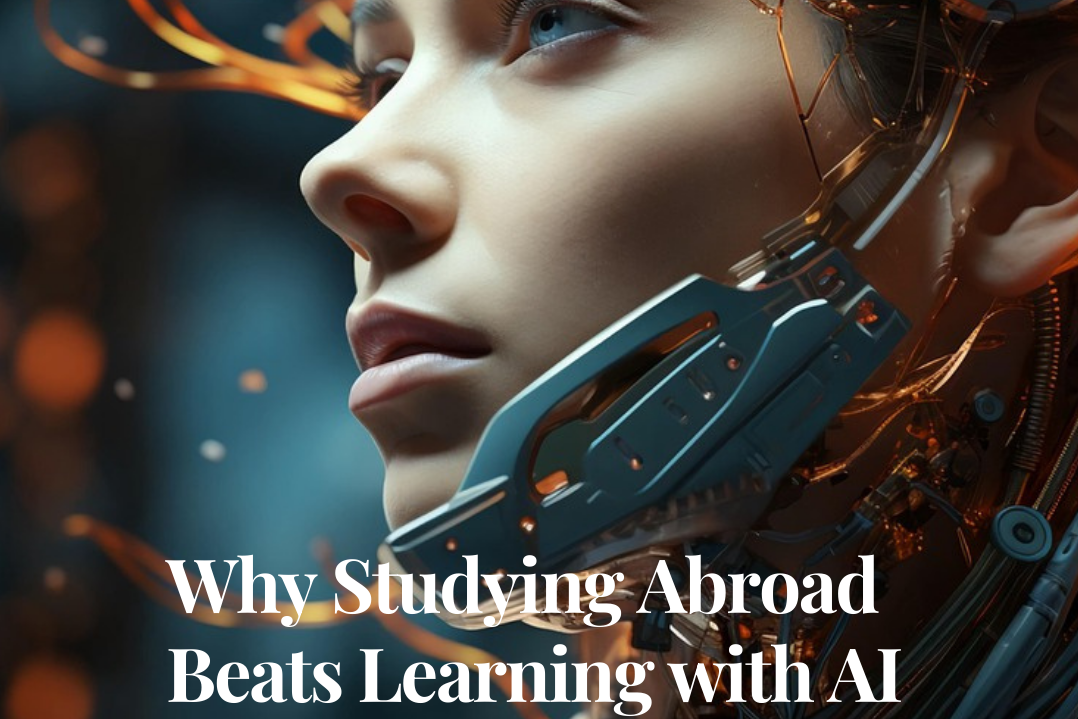
Introduction
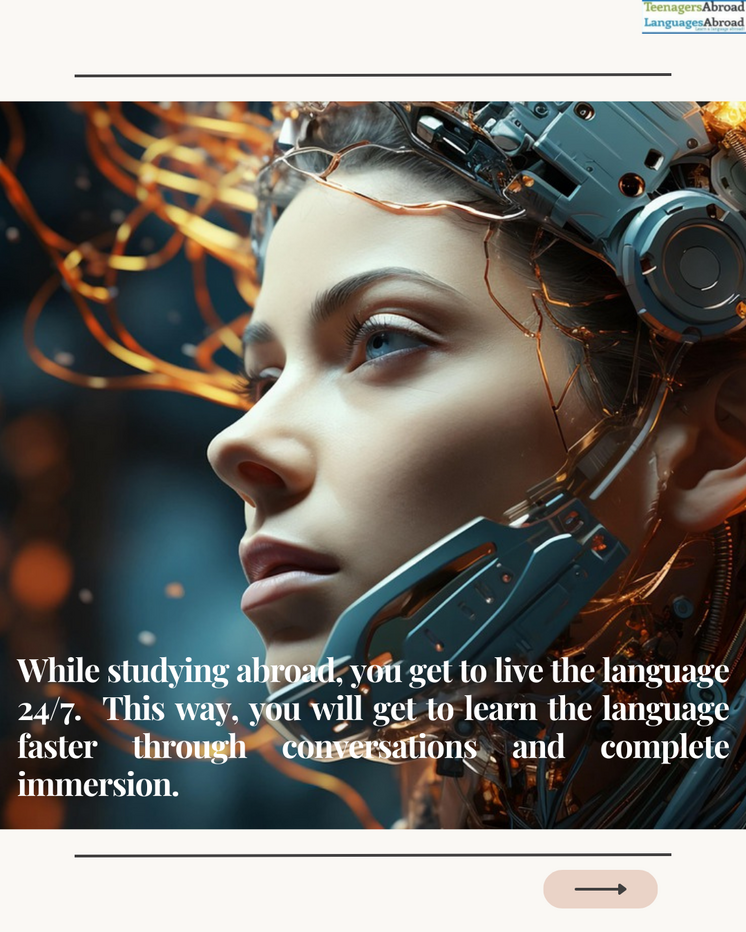
Before delving deep into the integration of artificial intelligence with studying abroad, the various kinds of AI tools and their respective utilities, and how the vast field of education is revolutionized through the advent of AI, it would be better to pause, consider, and reflect upon what AI actually means.
At its core, artificial intelligence is a branch of computer science focused on building systems which can carry out tasks normally requiring human intelligence. This can range from simple functions, like autocorrecting a message, to more advanced features such as recommending movies based on viewing history or enabling virtual assistants to answer questions.
In education, AI is mainly applied to support teaching and learning- for example, by adapting content to individual learners, automating routine administrative work, or analyzing learning patterns to provide useful insights.
However, the effectiveness of these tools depends on the type of artificial intelligence which powers them. Broadly speaking, most educational applications draw on two main categories: Rule-based AI and Data-driven AI.
Rule-Based AI
Rule-based AI represents one of the earliest and simplest forms of artificial intelligence. Its behavior is entirely predictable, since it follows predefined rules set by programmers. For instance, in a language learning app, a rule-based system might provide the same feedback message for all students who select a specific incorrect answer in a multiple-choice question. Since the feedback is fixed in advance, it does not adapt to individual learners.
While limited compared to modern AI, these systems laid the foundation for the more sophisticated tools available today.
Generative AI
Generative AI (GenAI) is a form of artificial intelligence designed to create new content, from text and images to music and video. In language learning, it often uses large language models (LLMs) to generate text that mimics human writing. Popular examples include ChatGPT, Google Gemini, and Microsoft Copilot.
For learners, AI tools such as vocabulary apps, grammar checkers, conversational chatbots, and intelligent tutoring systems provide immediate and personalized support. Such tools can quickly assess learner needs, adapt materials, and provide feedback, while also handling repetitive tasks like drills and corrections, which frees teachers to focus on higher-level guidance.
AI has long supported computer-assisted language learning, progressing from basic rule-based systems to today's advanced generative tools. GenAI, in particular, is expected to transform education by offering more immersive and interactive learning experiences, even though its full impact is still unfolding.
Today, artificial intelligence is capable of serving as a conversation partner to students, as it can aid students with pronunciation training, and through intelligent personal assistancs like Alexa or Google Assistant and chatbots. It can also equip students with adaptive learning systems and personalised dashboards, serve as a catalyst for motivation for goal-setting and agency over their learning process, in a way which requires integrating AI tools to support autonomy and engagement with opportunities for real-world interaction and collaboration and a more balanced, effective learning environment
Enhanced learning through Technology
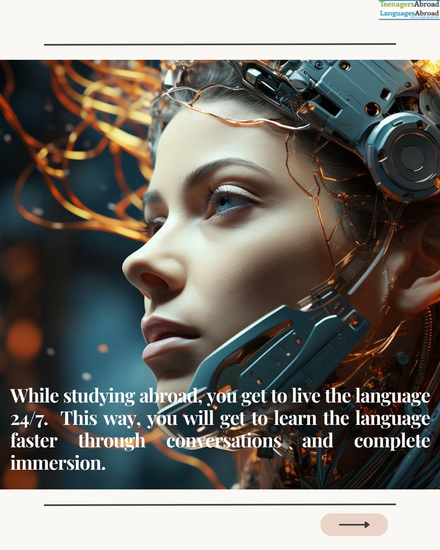
AI-based technologies, such as language processing algorithms and translation apps, are known to considerably aid students in overcoming language barriers.
Tools like real-time translation apps enable non-native speakers to navigate regular situations with ease, facilitating a smoother cultural transition.
AI‑enabled platforms personalize practice and feedback using recommendation systems and large language models.
Some features-such as Duolingo Max's GPT‑4 "Roleplay" and Khan Academy's Khanmigo pilot-show how AI augments existing platforms rather than replacing them.
Virtual and augmented reality (VR/AR) can further support engagement by visualizing places and processes before learners travel.
However, systematic reviews and experimental studies in higher education emphasize that outcomes depend on instructional design and that poorly designed VR can increase cognitive load.
In short: VR/AR are valuable complements, not substitutes for fieldwork.
Personalized education for diverse learners
A significant advantage of AI is its ability to tailor educational experiences to individual needs. Students pursuing studies abroad can benefit from AI-driven tools which adapt content to suit their learning pace and style. This personalization enhances retention and understanding, in turn empowering students to achieve their academic goals more efficiently.AI tailors especially for international students, from grammar feedback to reading aids and adaptive practice.
Educators may also utilize analytics to identify strengths and gaps and to recommend targeted resources. Used thoughtfully, these tools make learning effective and aligned with individual goals. The tools of AI are also diverse in nature, which can aid diverse learning styles, viz; interactive lessons, video tutorials and even gamified learning experiences, suited to both visual learners and the others who prefer auditory input.
Making education more accessible
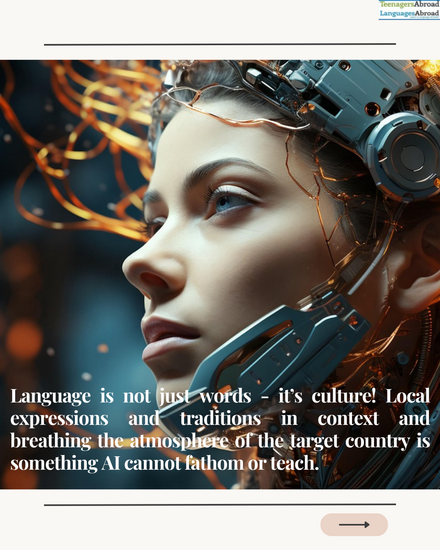
The importance of AI accessibility in education cannot be overstated, in terms of enhancing educational outcomes, reducing inequality, and fostering an inclusive and supportive learning environment.
AI helps in improving education equity, as it helps break down barriers created by limited access to resources, enabling students from underprivileged backgrounds to gain equal opportunities to learn.
AI tools provide personalized instruction, which adapts to the student's learning abilities, ensuring every student receives adequate support to succeed.
AI is also a boon for students with learning disabilities or unique learning needs, as it offers a solution by providing customized content to address specific learning difficulties.
For example, AI systems can help students with dyslexia by offering text-to-speech features, and visually impaired students can utilize AI-powered screen readers to access written materials.
AI-powered tools also help enhance learning outcomes by providing students instant feedback and enabling them to track their progress in real time. This helps in faster identification of areas of improvement, leading to better outcomes and an overall fruitful and engaging learning experience.
However, AI has its limitations
- Privacy and data security: As more data are collected, student privacy must be protected; UNESCO's 2023 guidance urges clear policies, data‑protection standards, and age‑appropriate use.
- Digital inequality: Access to reliable devices and connectivity remains uneven across regions and schools.
- Bias and ethics: Without oversight, AI systems can reflect or amplify societal biases; institutions should publish transparent AI use policies and teacher training plans.
Why studying abroad still leads the way
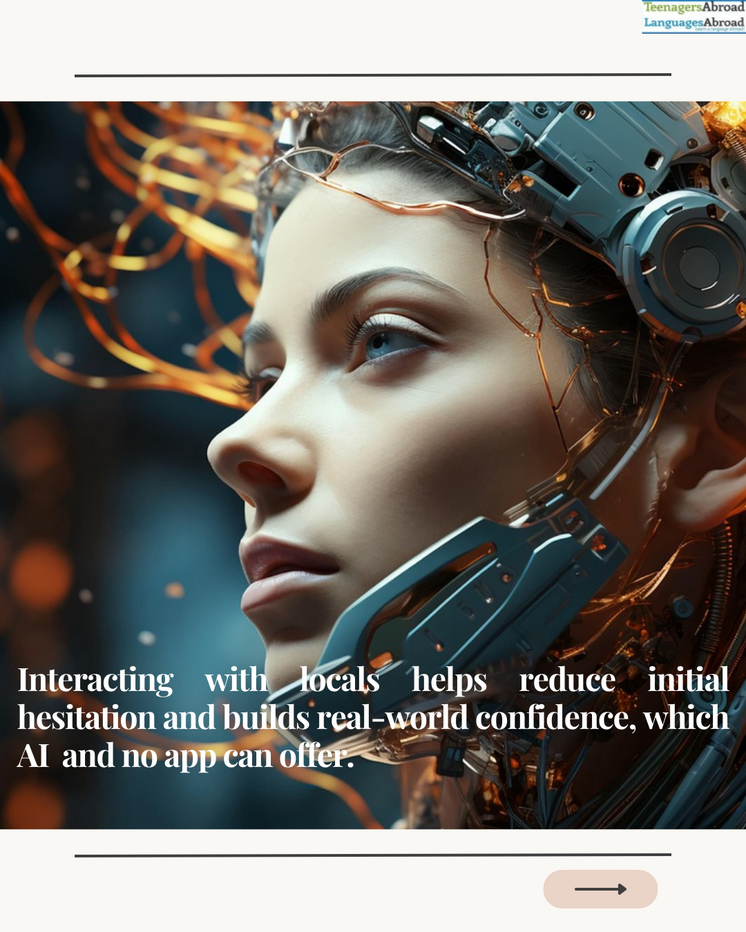
1. Real, Human Interaction
Nothing compares to face‑to‑face conversations with locals, hosts, and classmates. These interactions carry emotional nuance, spontaneous humor, and tacit cultural cues that no chatbot can fully replicate.
2. Cultural Immersion Beyond Words
Language is more than grammar; it is inseparable from culture. Immersion teaches not only what to say but how, when, and to whom.
Our programs combine full‑day language immersion with curated local excursions-so learners don't just study the language; they live it.
3. Motivation That Comes From Real‑Life Pressure
When you're abroad, everyday tasks-ordering food, navigating transport, attending classes-create authentic reasons to use the language. This builds durable habits, confidence, and retention. Mistakes become part of the adventure.
4. Personal Growth and Independence
Living in another country stretches your problem‑solving, adaptability, and resilience. Those life skills are difficult to develop through software alone.
5. Unscripted, Memorable Moments
Real life is unpredictable in the best way: festivals, friendships, and traditions you didn't plan for. These moments make language sticky and memorable.
6. Academic and Career Value
Large‑scale European research links international mobility with better employment outcomes. The Erasmus Impact Study found that five years after graduation, mobile students' unemployment rate was 23% lower than that of non‑mobile peers.
Graduates from our programs go on to pursue degrees in Germany, France, and the United Kingdom and secure internships and work placements-because mastering the local language opens doors.
By the numbers (why Immersion matters)
- Erasmus Impact Study: −23% unemployment five years post‑graduation for mobile graduates.
- Study‑abroad cohorts tend to make larger gains in oral fluency than at‑home learners in comparable time frames.
- U.S. study‑abroad participation rebounded to 280,716 for credit in 2022/23 (+49% year‑over‑year).
Beyond Language: Personal development at an international level
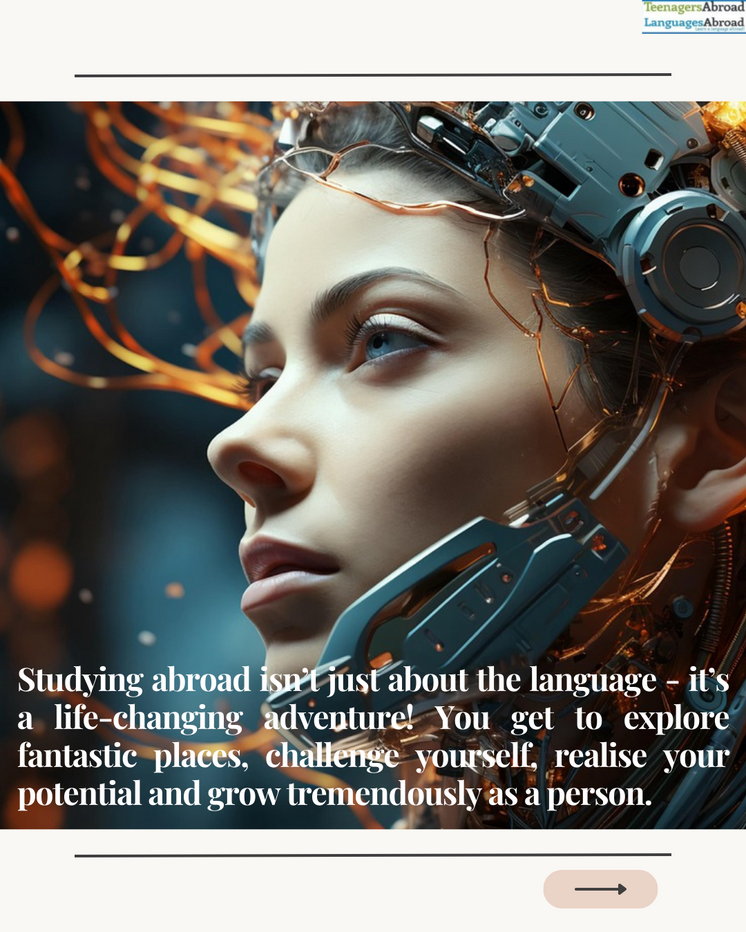
Spending time abroad changes more than your accent-it reshapes how you think, decide, and lead. Research in psychology and higher education links time abroad with gains in creativity and complex thinking, measurable personality growth, and long‑term global engagement. In other words, you learn to operate outside your comfort zone on an international level-and that growth endures.
• Think more creatively: Living abroad is associated with higher creativity; experimental work shows that reflecting on adapting to a foreign culture increases creative problem‑solving.
• Integrate perspectives (and advance professionally): Developing a bicultural identity predicts higher integrative complexity-the ability to hold and connect multiple viewpoints -which in turn predicts creative output and even workplace outcomes (e.g., promotion rates, reputational gains). A longitudinal study of MBA students found that multicultural engagement predicted more job offers via increases in integrative complexity.
Grow as a person: Longitudinal research on ERASMUS sojourners finds increases in openness and agreeableness and decreases in neuroticism - with new international support networks explaining much of this change.
• Build a global mindset: Pre‑/post assessments using the Global Perspective Inventory show growth across cognitive, intrapersonal, and interpersonal dimensions after a semester abroad. Alumni studies also link study abroad with long‑term civic engagement, knowledge production, philanthropy, and social entrepreneurship.
• Why it works: Study abroad is a recognized high‑impact educational practice - itcombines challenge, feedback, reflection, and diverse interactions, conditions that reliably drive deep learning and personal development.
Ethical Considerations
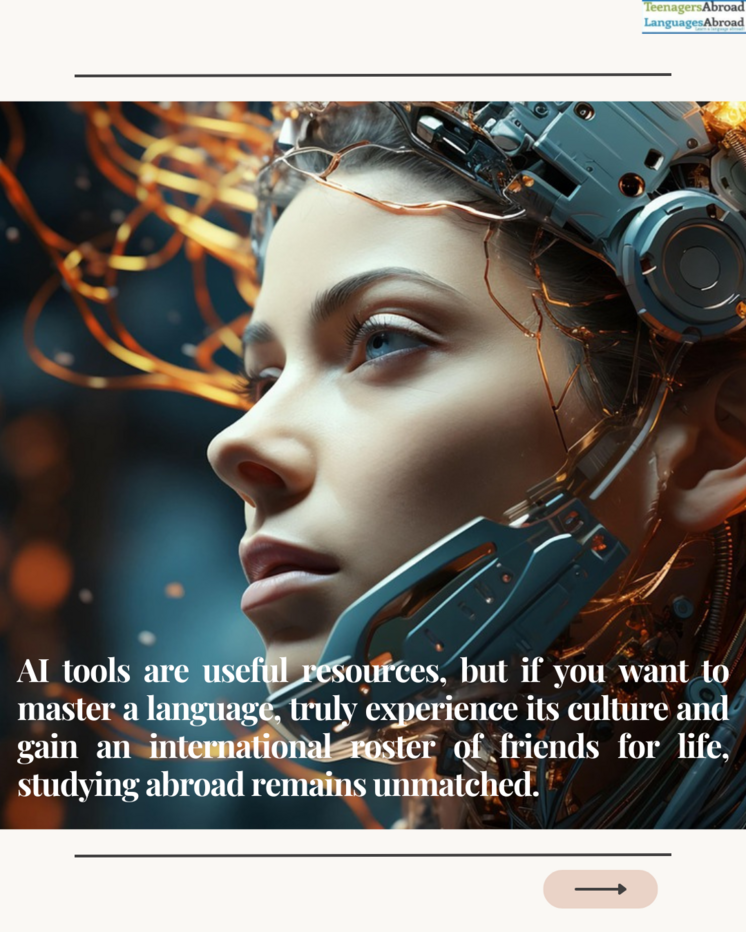
The drastic increase in the usage of AI in language learning offers several key benefits, however, it also raises ethical questions which need careful reflection. Below are some of the most important concerns:
Digital Divide
Not all learners have equal access to technology. Within and across countries, differences in socioeconomic status, geography, or even gender can limit who benefits from AI tools. If these technologies truly improve learning outcomes, ensuring fair and widespread access becomes a priority to avoid widening existing inequalities.
Data Privacy and Security
AI-powered language apps depend heavily on collecting user data, which can include personal details, voice recordings, and detailed learning behaviors. Protecting this information and being transparent about how it is stored, shared, and used is essential. Without strict safeguards, students risk having their privacy compromised.
Overreliance on AI
While AI offers quick feedback and personalized learning, relying too much on it may reduce opportunities for students to develop critical thinking and problem-solving skills. Learners need to stay active participants in their education and be aware of the potential inaccuracies or limitations of AI-generated responses.
Bias and Fairness
AI systems reflect the data they are trained on. If that data carries stereotypes or cultural blind spots, the output can also be biased or insensitive-particularly in tools not specifically built for education, such as some generative AI systems. Moreover, algorithms that track learner progress may unintentionally favor certain groups over others.
To address this, educators and developers must carefully test and monitor AI outcomes before applying them in classrooms.


